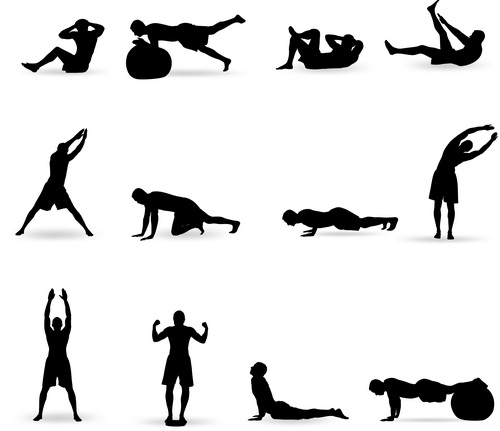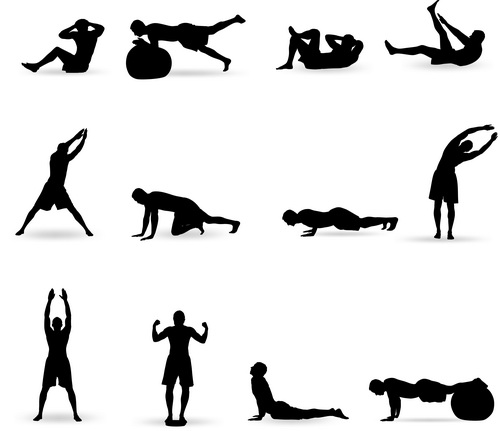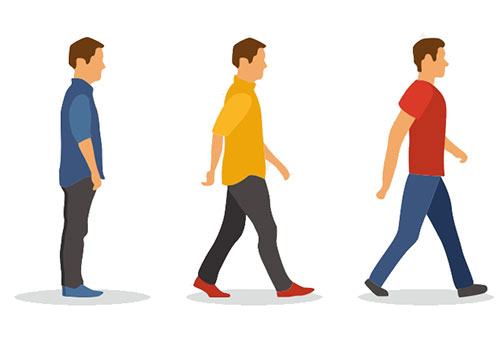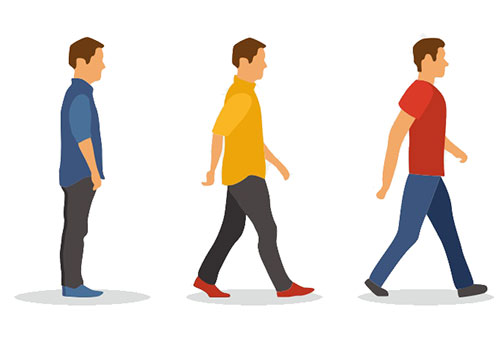exercise
To do sports or physical activities in order to stay healthy and become stronger

ورزش کردن
He would never exercise - he was terribly lazy.
او هیچ وقت ورزش نمی کرد، او خیلی تنبل بود.
To do sports or physical activities in order to stay healthy and become stronger

ورزش کردن
He would never exercise - he was terribly lazy.
او هیچ وقت ورزش نمی کرد، او خیلی تنبل بود.
Oxford Essential Dictionary
exercise
verb (exercises, exercising, exercised )
to move your body to keep it strong and well:
They exercise in the park every morning.
noun
1 (no plural) moving your body to keep it strong and well:
Swimming is very good exercise.
2 (plural exercises) a special movement that you do to keep your body strong and well:
This exercise is good for your back.
3 (plural exercises) a piece of work that you do to learn something:
Please do exercises 1 and 2 for homework.
Longman Dictionary of Contemporary English
exercise
I. ex‧er‧cise1 S2 W2 /ˈeksəsaɪz $ -ər-/ BrE AmE noun
[Date: 1300-1400; Language: French; Origin: exercice, from Latin exercitium, from exercere 'to drive on, keep busy']
1. FOR HEALTH [uncountable] physical activities that you do in order to stay healthy and become stronger:
Try to fit some regular exercise into your daily routine.
Working in an office, I don’t get much exercise.
do/take exercise
Most people need to do more exercise.
gentle/light exercise
Gentle exercise can be beneficial for older people.
vigorous/strenuous exercise
After the operation, you should avoid strenuous exercise.
2. MOVEMENT [countable] a movement or set of movements that you do regularly to keep your body healthy:
stretching exercises
You can do exercises to strengthen your stomach muscles.
3. FOR A SKILL [countable usually plural] an activity or process that helps you practise a particular skill:
relaxation exercises
role-play exercises
4. IN A BOOK [countable] a set of questions in a book that test a student’s knowledge or skill:
Do Exercises 3 and 4 on page 51 for homework.
5. FOR A PARTICULAR RESULT [singular] an activity or situation that has a particular quality or result:
closing libraries as part of a cost-cutting exercise
It’s a pointless exercise.
exercise in
Buying a house can be an exercise in frustration.
6. ARMY/NAVY ETC [uncountable and countable] a set of activities for training soldiers etc:
a military exercise
on exercise
Half the unit was away on exercise.
7. the exercise of something formal the use of a power or right:
the exercise of political leadership
• • •
COLLOCATIONS (for Meaning 1)
■ verbs
▪ do some exercise (also take some exercise British English) He ought to do more exercise. | He was advised by the doctor to take more exercise.
▪ get some exercise I don’t get enough exercise.
■ adjectives
▪ good exercise Swimming is very good exercise for your muscles.
▪ regular/daily exercise Taking regular exercise is the best way to improve your overall health.
▪ physical exercise Physical exercise keeps you fit and helps to reduce stress.
▪ hard/strenuous/vigorous exercise (=involving a lot of physical effort) Pregnant women should avoid strenuous exercise.
▪ gentle/light/moderate exercise (=not involving too much physical effort) Try to do some gentle exercise as part of your daily routine.
▪ aerobic exercise (=in which you breathe deeply and your heart beats faster) Aerobic exercise, such as jogging or cycling, is a great way to burn off fat.
■ phrases
▪ a type/form of exercise This type of exercise is excellent for losing weight.
▪ lack of exercise Children are becoming overweight through lack of exercise.
■ exercise + NOUN
▪ an exercise programme/routine/regime British English, an exercise program American English (=a plan that includes different types of exercise) The athletes follow an intensive exercise programme. | I’m finding it quite hard to stick to my exercise routine.
▪ an exercise class I usually go to my exercise class on Wednesdays.
• • •
COLLOCATIONS (for Meaning 2)
■ verbs
▪ do an exercise (also perform an exercise formal) Try to do these exercises at least three days a week.
■ ADJECTIVES/NOUN + exercise
▪ a basic exercise (=simple) He showed me some basic exercises for strengthening leg muscles.
▪ keep-fit exercises I couldn’t get to the gym, so I did a few keep-fit exercises in my bedroom.
▪ a warm-up exercise Do some warm-up exercises before lifting heavy weights.
▪ a yoga exercise Yoga exercises keep you supple.
▪ a breathing exercise We do breathing exercises in my yoga class.
II. exercise2 S3 W2 BrE AmE verb
1. USE SOMETHING [transitive] formal to use a power, right, or quality that you have:
There are plans to encourage people to exercise their right to vote.
People who can exercise some control over their surroundings feel less anxious.
2. DO PHYSICAL ACTIVITY [intransitive] to do sports or physical activities in order to stay healthy and become stronger:
It’s important to exercise regularly.
3. USE PART OF YOUR BODY [transitive] to make a particular part of your body move in order to make it stronger:
Swimming exercises all the major muscle groups.
4. ANIMAL [transitive] to make an animal walk or run in order to keep it healthy and strong:
people exercising their dogs in the park
5. MAKE SOMEBODY THINK [transitive] formal
a) to make someone think about a subject or problem and consider how to deal with it:
It’s an issue that’s exercised the minds of scientists for a long time.
b) British English if something exercises someone, they think about it all the time and are very anxious or worried – often used humorously:
It was clear that Flavia had been exercised by this thought.
• • •
THESAURUS
▪ exercise to walk, do sports etc in order to stay healthy and become stronger: To lose weight, exercise regularly and eat less.
▪ do some exercise/a lot of exercise etc this phrase is much more common than the verb exercise, and means the same thing: Her doctor said that she needed to do more exercise. | My son does very little exercise – I don’t know how he stays so slim. | Dogs need lots of exercise.
▪ stay/keep/get in shape to stay or to become physically healthy and strong – used especially when you consider exercise as a way to keep a nice-looking body: Try jogging with a friend who also wants to get in shape.
▪ keep fit British English to exercise regularly in order to stay healthy and strong: The class encourages older people to keep fit.
▪ work out to do exercise in order to be healthy and strong, especially to exercise regularly in a gym or exercise class: He works out three times a week.
▪ tone up (also firm up) to exercise in order to make your body or part of your body firmer: I need to tone up my stomach and legs.
▪ warm up to do gentle exercises to prepare your body for more active exercise: It’s important to warm up before you begin to play.
▪ stretch to reach your arms, legs, or body out to full length, in order to make your muscles as long as possible, so that you do not injure them when you exercise: Jog for five minutes, then stretch before starting on your run.
▪ limber up (also loosen up) to do gentle exercises so that your muscles are warm and not tight before you begin a more active exercise: The footballers were limbering up before a training session.
▪ train especially British English to prepare for a sporting event by exercising in a particular way: She’s training to do the London Marathon.
▪ practise British English, practice American English to do a sports activity regularly, in order to get better and prepare for competition: The team practices on Wednesdays and Saturdays.
Oxford Advanced Learner's Dictionary
exercise
ex·er·cise [exercise exercises exercised exercising] noun, verb [ˈeksəsaɪz] [ˈeksərsaɪz]
noun
ACTIVITY/MOVEMENTS
1. uncountable physical or mental activity that you do to stay healthy or become stronger
• Swimming is good exercise.
• I don't get much exercise sitting in the office all day.
• The mind needs exercise as well as the body.
• vigorous/gentle exercise
• (BrE) to take exercise
2. countable a set of movements or activities that you do to stay healthy or develop a skill
• breathing/relaxation/stretching exercises
• exercises for the piano
• Repeat the exercise ten times on each leg.
QUESTIONS
3. countable a set of questions in a book that tests your knowledge or practises a skill
• grammar exercises
• Do exercise one for homework.
USE OF POWER/RIGHT/QUALITY
4. uncountable ~ of sth the use of power, a skill, a quality or a right to make sth happen
• the exercise of power by the government
• the exercise of discretion
FOR PARTICULAR RESULT
5. countable an activity that is designed to achieve a particular result
• a communications exercise
• In the end it proved a pointless exercise.
• ~ in sth an exercise in public relations
• Staying calm was an exercise in self-control.
FOR SOLDIERS
6. countable, usually plural a set of activities for training soldiers
• military exercises
CEREMONIES
7. exercises plural (NAmE) ceremonies
• college graduation exercises
Word Origin:
Middle English (in the sense ‘application of a right’): via Old French from Latin exercitium, from exercere ‘keep busy, practise’, from ex- ‘thoroughly’ + arcere ‘keep in or away’.
Culture:
sport and fitness
The British are very fond of sport, but many people prefer to watch rather than take part. Many go to watch football, cricket, etc. at the ground, but many more sit at home and watch sport on television.
Most people today take relatively little general exercise. Over the last 30 or 40 years lifestyles have changed considerably and many people now travel even the shortest distances by car or bus. Lack of exercise combined with eating too many fatty and sugary foods has meant that many people are becoming too fat. Experts are particularly concerned that children spend a lot of their free time watching television or playing computer games instead of being physically active. In recent years, however, there has been a growing interest in fitness among young adults and many belong to a sports club or gym.
In Britain most towns have an amateur football and cricket team, and people also have opportunities to play sports such as tennis and golf. Older people may play bowls. Some people go regularly to a sports centre or leisure centre where there are facilities for playing badminton and squash, and also a swimming pool. Some sports centres arrange classes in aerobics, step and keep-fit. Some people work out (= train hard) regularly at a local gym and do weight training and circuit training. A few people do judo or other martial arts. Others go running or jogging in their local area. For enthusiastic runners there are opportunities to take part in long-distance runs, such as the London marathon. Other people keep themselves fit by walking or cycling. Many people go abroad on a skiing holiday each year and there are several dry slopes and snowdomes in Britain where they can practise.
Membership of a sports club or gym can be expensive and not everyone can afford the subscription. Local sports centres are generally cheaper. Evening classes are also cheap and offer a wide variety of fitness activities ranging from yoga to jazz dancing. Some companies now provide sports facilities for their employees or contribute to the cost of joining a gym.
Sports play an important part in American life. Professional baseball and football games attract large crowds, and many people watch games on television. Although many parents complain about their children being couch potatoes (= people who spend a lot of time watching television), there are sports sessions at school for all ages. College students are usually also required to take physical education classes to complete their studies.
Many popular keep-fit activities began in the US. Charles Atlas, Arnold Schwarzenegger and others inspired people to take up bodybuilding (= strengthening and shaping the muscles). Many women joined the ‘fitness craze’ as a result of video workouts produced by stars such as Jane Fonda and Cindy Crawford which they could watch and take part in at home. New fitness books are continually being published and these create fashions for new types of exercise, such as wave aerobics, which is done in a swimming pool, and cardio kick-boxing, a form of aerobics which involves punching and kicking a punchbag. Many richer people employ their own personal trainer, either at home or at a fitness centre, to direct their exercise programme. Local YMCAs offer programmes which include aerobics, gym, running, weights, treadmills and rowing machines, as well as steam rooms and swimming. But many people just walk or jog in the local park or play informal games of baseball or football.
Thesaurus:
exercise noun
1. U, C
• Swimming is good exercise.
training • • workout • • aerobics • |BrE sport • • PE • |AmE sports • • P.E. •
do exercises/training/a workout/ aerobics/sport/PE
2. C
• Do one exercise for homework.
assignment • • task • • homework •
a/an easy/difficult exercise/assignment/task
do an exercise/a task/your homework
give/set (sb) some exercises/an assignment/a task/their homework
Collocations:
Diet and exercise
Weight
put on/gain/lose weight/a few kilos/a few pounds
watch/control/struggle with your weight
be/become seriously overweight/underweight
be/become clinically/morbidly obese
achieve/facilitate/promote/stimulate weight loss
slim down to 70 kilos/(BrE) 11 stone/(especially NAmE) 160 pounds
combat/prevent/tackle/treat obesity
develop/have/suffer from/struggle with/recover from anorexia/bulimia/an eating disorder
be on/go on/follow a crash/strict diet
have/suffer from a negative/poor body image
have/develop a positive/healthy body image
Healthy eating
eat a balanced diet/healthily/sensibly
get/provide/receive adequate/proper nutrition
contain/get/provide essential nutrients/vitamins/minerals
be high/low in calories/fat/fibre/(especially US) fiber/protein/vitamin D/Omega-3 fatty acids
contain (no)/use/be full of/be free from additives/chemical preservatives/artificial sweeteners
avoid/cut down on/cut out alcohol/caffeine/fatty foods
stop/give up/ (especially NAmE) quit smoking
Exercise
(BrE) take regular exercise
do moderate/strenuous/vigorous exercise
play football/hockey/tennis
go cycling/jogging/running
go to/visit/ (especially NAmE) hit/work out at the gym
strengthen/tone/train your stomach muscles
contract/relax/stretch/use/work your lower-body muscles
build (up)/gain muscle
improve/increase your stamina/energy levels/physical fitness
burn/consume/expend calories
Staying healthy
be/get/keep/stay healthy/in shape/(especially BrE) fit
lower your cholesterol/blood pressure
boost/stimulate/strengthen your immune system
prevent/reduce the risk of heart disease/high blood pressure/diabetes/osteoporosis
reduce/relieve/manage/combat stress
enhance/promote relaxation/physical and mental well-being
Example Bank:
• Ask your students to try this exercise before the next class.
• Before embarking on any exercise, you should conduct a cost-benefit analysis.
• Combine yoga with stretching and floor exercises.
• Do you take enough exercise?
• Half the regiment was away on exercise.
• He began his daily exercises.
• I did try some basic relaxation exercises.
• John never does any exercise.
• Lack of exercise is a risk factor in heart disease.
• Mental exercises can help older people to sustain their mental abilities.
• Practise/Practice the following exercise at least twice a day.
• Remember to do your breathing exercises every day.
• Role-playing situations allows a finer assessment to be made than in pen and paper exercises.
• She recommends the following exercises to increase circulation.
• Stop frequently to rest during exercise until you are fitter.
• The Government instituted a massive exercise in social control.
• The company has just carried out a major cost-cutting exercise.
• The doctor recommended regular exercise.
• The object of the exercise is to increase public awareness of environmental issues.
• The seminar was a valuable exercise in information exchange.
• The troops go on exercises twice a year.
• The whole consultation process was just a cynical political exercise.
• They recently completed a four-week exercise in Poland.
• This is a great exercise for the upper back.
• This is not a purely academic exercise: it should have a real impact on the way we work as a department.
• Try to do fifteen minutes of gentle exercise every day.
• US forces took part in joint exercises with the British Navy.
• We have conducted training exercises in seven separate states.
• We run team-building exercises with employees at each office.
• We were out on a field exercise.
• Weight-bearing exercise increases the health of bones.
• You can devise your own exercises to music.
• You may find it helpful to perform this exercise in front of the mirror.
• You will complete these exercises for homework.
• an exercise in translation
• an improper exercise of a discretionary power
• the effective exercise of power by the government
• the free exercise of informed choice
• to limit the exercise of political power
• As a public relations exercise the festival was clearly a success.
• Do one exercise for homework.
• I don't get much exercise sitting in the office all day.
• One of these powers is the exercise of discretion by police officers.
• Remember to take regular exercise.
• Sovereignty means more than just the exercise of power.
• breathing/relaxation/stretching exercises
• vigorous/gentle exercise
verb
USE POWER/RIGHT/QUALITY
1. transitive ~ sth (formal) to use your power, rights or personal qualities in order to achieve sth
• When she appeared in court she exercised her right to remain silent.
• He was a man who exercised considerable influence over people.
DO PHYSICAL ACTIVITY
2. intransitive, transitive to do sports or other physical activities in order to stay healthy or become stronger; to make an animal do this
• an hour's class of exercising to music
• How often do you exercise?
• ~ sth Horses need to be exercised regularly.
3. transitive ~ sth to give a part of the body the movement and activity it needs to keep strong and healthy
• These movements will exercise your arms and shoulders.
BE ANXIOUS
4. usually passive ~ sb/sth (about sth) (formal) if sb is exercised about sth, they are very anxious about it
• The public are less exercised about this matter than the media.
• This very problem has exercised the minds of some of our most eminent scientists.
Word Origin:
Middle English (in the sense ‘application of a right’): via Old French from Latin exercitium, from exercere ‘keep busy, practise’, from ex- ‘thoroughly’ + arcere ‘keep in or away’.
Thesaurus:
exercise verb I, T
• How often do you exercise?
work out • • train • • warm up • |especially BrE keep fit •
exercise/train/warm up properly
exercise/train/work out regularly
exercise/train a horse/dog
Exercise or work out? Exercise can be any type of physical activity; working out usually involves using equipment in a gym.
Example Bank:
• Each of us has a vote— if we choose to exercise it.
• It is necessary to exercise caution when making recommendations.
• Managers are free to exercise their discretion in these cases.
• The all-powerful steering committee continued to exercise control.
• The company's representative failed to exercise due care.
• They found themselves unable to exercise influence and maintain independence.
• They have the right to exercise self-determination.
• the conditions necessary to fully exercise these rights
• the purposes for which power can be rightfully exercised
• the right to freely exercise your religion
• Care must be exercised to ensure there is no cross-contamination between samples.
• I've just done an hour's class of exercising to music.
Cambridge Advanced Learner's Dictionary
exercise
exercise (USE) /ˈek.sə.saɪz/ US /-sɚ-/
verb [T] FORMAL
to use something:
I exercised my democratic right by not voting in the election.
Always exercise caution when handling radioactive substances.
We've decided to exercise the option (= use the part of a legal agreement) to buy the house we now lease.
exercise /ˈek.sə.saɪz/ US /-sɚ-/
noun [U]
The exercise of (= use of) restraint may well be difficult.
exercise (PRACTISING) /ˈek.sə.saɪz/ US /-sɚ-/
noun [C]
1 an action or actions intended to improve something or make something happen:
Ships from eight navies will be taking part in an exercise in the Pacific to improve their efficiency in combat.
It would be a useful exercise for you to say the speech aloud several times.
an exercise in public relations
2 a short piece of written work which you do to practise something you are learning:
The book has exercises at the end of every chapter.
exercises /ˈek.sə.saɪ.zɪz/ US /-sɚ-/
plural noun US FORMAL
a ceremony which includes speeches and usually traditional music or activities:
graduation/inaugural exercises
exercise (HEALTHY ACTIVITY) /ˈek.sə.saɪz/ US /-sɚ-/
noun [C or U]
physical activity that you do to make your body strong and healthy:
Swimming is my favourite form of exercise.
You really should take more exercise.
I do stomach exercises most days.
exercise /ˈek.sə.saɪz/ US /-sɚ-/
verb
1 [I or T] to do physical activities to make your body strong and healthy:
She exercises most evenings usually by running.
A work-out in the gym will exercise all the major muscle groups.
2 [T] If you exercise an animal, you make it walk or run so that it stays strong and healthy:
Now he's retired he spends most afternoons exercising his dogs.
Collins COBUILD Advanced Learner’s English Dictionary
exercise
/eksə(r)saɪz/
(exercises, exercising, exercised)
Frequency: The word is one of the 1500 most common words in English.
1.
If you exercise something such as your authority, your rights, or a good quality, you use it or put it into effect. (FORMAL)
They are merely exercising their right to free speech...
Britain has warned travellers to exercise prudence and care.
VERB: V n, V n
•
Exercise is also a noun.
...the exercise of political and economic power...
Leadership does not rest on the exercise of force alone.
N-SING: N of n
2.
When you exercise, you move your body energetically in order to get fit and to remain healthy.
She exercises two or three times a week...
Exercising the body does a great deal to improve one’s health.
VERB: V, V n
•
Exercise is also a noun.
Lack of exercise can lead to feelings of depression and exhaustion...
N-UNCOUNT
3.
If a movement or activity exercises a part of your body, it keeps it strong, healthy, or in good condition.
They call rowing the perfect sport. It exercises every major muscle group.
VERB: V n
4.
Exercises are a series of movements or actions which you do in order to get fit, remain healthy, or practise for a particular physical activity.
I do special neck and shoulder exercises...
N-COUNT: usu pl
5.
Exercises are military activities and operations which are not part of a real war, but which allow the armed forces to practise for a real war.
General Powell predicted that in the future it might even be possible to stage joint military exercises...
N-COUNT: usu pl, also on N
6.
An exercise is a short activity or piece of work that you do, for example in school, which is designed to help you learn a particular skill.
Try working through the opening exercises in this chapter...
N-COUNT
7.
If you describe an activity as an exercise in a particular quality or result, you mean that it has that quality or result, especially when it was not intended to have it.
As an exercise in stating the obvious, this could scarcely be faulted...
Think what a waste of taxpayers’ money the whole exercise was.
N-COUNT: usu sing, usu N in n/-ing
8.
If something exercises you or your mind, you think or talk about it a great deal, especially because you are worried or concerned about it.
This has been a major problem exercising the minds of scientists around the world...
Merriam-Webster's Advanced Learner's Dictionary
exercise
2exercise verb -cis·es; -cised; -cis·ing
1 [no obj] : to do physical activities in order to make yourself stronger and healthier
• It's important to exercise every day.
• He eats right and exercises regularly.
2 [+ obj]
a : to use (a body part) again and again in order to make it stronger
• exercise a muscle
• Bicycle riding exercises the leg muscles.
b : to cause (an animal) to walk, run, etc., : to give exercise to (an animal)
• The stable boys exercise the horses every morning.
3 [+ obj] : to use (an ability, power, etc.)
• He didn't exercise good judgment.
• We just need to exercise common sense.
• She has been reluctant to exercise her authority.
• Exercise caution when using these chemicals.












